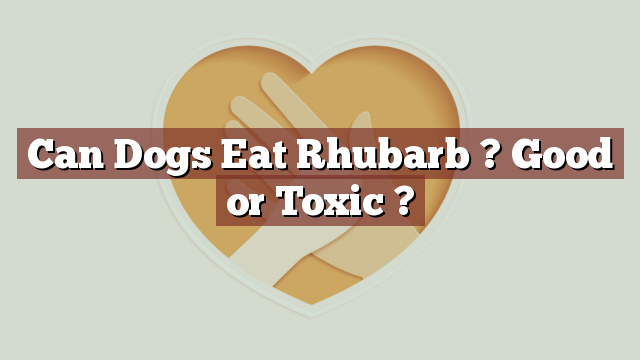Can Dogs Eat Rhubarb? Good or Toxic?
Knowing which foods are safe for our furry friends is crucial for their overall well-being. While some foods can provide nutritional benefits, others can be toxic and pose serious health risks. One such food that often raises questions is rhubarb. In this article, we will explore whether dogs can safely consume rhubarb and the potential risks or benefits associated with it.
Nutritional Value of Rhubarb: Vitamins, Minerals, and more
Before we delve into the safety aspect, let’s take a look at the nutritional value of rhubarb. Rhubarb is a vegetable that is often used in desserts and jams due to its tart flavor. It is low in calories and a good source of fiber, vitamin K, calcium, and potassium. Additionally, it contains small amounts of vitamin C and vitamin A.
Can Dogs Eat Rhubarb? Exploring Safety for Canine Consumption
No, dogs should not eat rhubarb. While rhubarb can be a nutritious food for humans, it can be harmful to dogs. Rhubarb contains oxalic acid, which can cause serious health issues in canines. Oxalic acid can bind to calcium, leading to the formation of calcium oxalate crystals in the kidneys. This can potentially result in kidney damage or even kidney failure.
Potential Risks or Benefits of Dogs Eating Rhubarb
The risks associated with dogs consuming rhubarb far outweigh any potential benefits. The high concentration of oxalic acid in rhubarb makes it toxic for dogs. Even a small amount of rhubarb can cause gastrointestinal distress, including vomiting, diarrhea, and abdominal pain. Moreover, the long-term effects of oxalic acid on a dog’s kidneys can be devastating and life-threatening.
What to Do if Your Dog Eats Rhubarb: Signs, Symptoms, and Treatment
If you suspect that your dog has ingested rhubarb, it is important to monitor them closely for any signs or symptoms of toxicity. These may include drooling, loss of appetite, weakness, tremors, or changes in urination patterns. If you notice any of these symptoms, it is crucial to seek veterinary assistance immediately.
The treatment for rhubarb toxicity in dogs typically involves supportive care to help flush the oxalic acid out of their system. This may include intravenous fluids, medications to control vomiting or diarrhea, and close monitoring of kidney function. It is essential to consult with a veterinarian to ensure the best course of action for your dog’s specific situation.
Conclusion: Weighing the Risks and Benefits of Rhubarb for Dogs
In conclusion, dogs should not eat rhubarb as it can be toxic and pose significant health risks. Although rhubarb is a nutritious vegetable for humans, the presence of oxalic acid makes it unsuitable for canine consumption. The potential complications, such as kidney damage or failure, make it crucial to keep rhubarb out of reach of our furry friends. If you suspect your dog has ingested rhubarb or any other potentially harmful substance, always consult with a veterinarian for guidance and appropriate treatment. Prioritizing the safety and well-being of our beloved pets is of utmost importance.
Thank you for investing your time in exploring [page_title] on Can-Eat.org. Our goal is to provide readers like you with thorough and reliable information about various dietary topics. Each article, including [page_title], stems from diligent research and a passion for understanding the nuances of our food choices. We believe that knowledge is a vital step towards making informed and healthy decisions. However, while "[page_title]" sheds light on its specific topic, it's crucial to remember that everyone's body reacts differently to foods and dietary changes. What might be beneficial for one person could have different effects on another. Before you consider integrating suggestions or insights from "[page_title]" into your diet, it's always wise to consult with a nutritionist or healthcare professional. Their specialized knowledge ensures that you're making choices best suited to your individual health needs. As you navigate [page_title], be mindful of potential allergies, intolerances, or unique dietary requirements you may have. No singular article can capture the vast diversity of human health, and individualized guidance is invaluable. The content provided in [page_title] serves as a general guide. It is not, by any means, a substitute for personalized medical or nutritional advice. Your health should always be the top priority, and professional guidance is the best path forward. In your journey towards a balanced and nutritious lifestyle, we hope that [page_title] serves as a helpful stepping stone. Remember, informed decisions lead to healthier outcomes. Thank you for trusting Can-Eat.org. Continue exploring, learning, and prioritizing your health. Cheers to a well-informed and healthier future!

